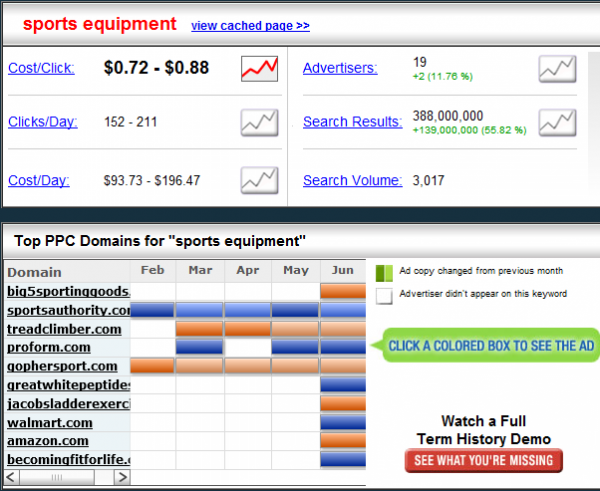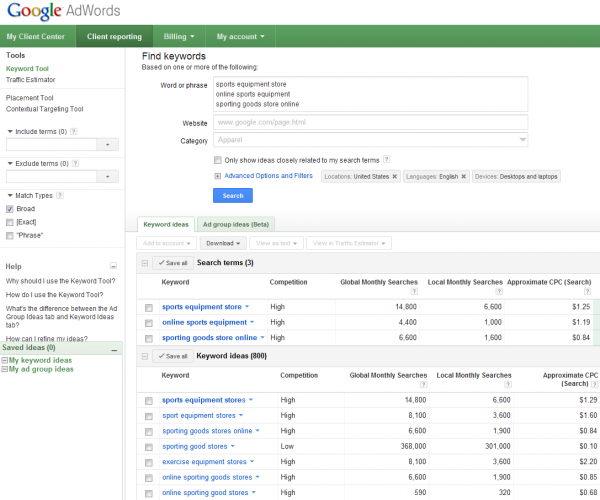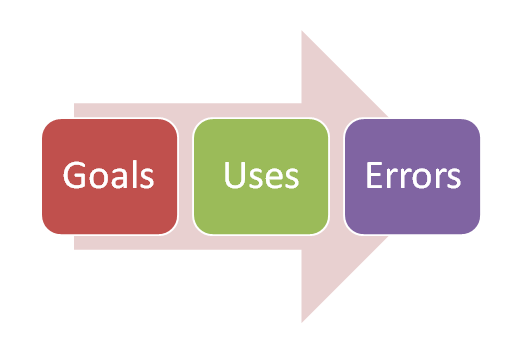Competitive keyword analysis should play in integral part in your paid and organic search optimization strategy. As paid search activity continues to grow, so will the number of businesses you compete against within the search battlefield.
Understanding who your competitors are and the keywords they’re optimizing for is critical to staying relevant, competitive and profitable in your pursuit to acquire more revenue. In this article, I’ll be walking through several advanced tips for conducting competitive keyword analysis and how to apply your findings to your own optimization strategies.
Another popular tool is SpyFu, shown below. In addition to providing a detailed list of your top paid and organic competitors, SpyFu also provides the domain, top paid and organic keywords, estimated daily budget, average position, and paid and organic click volume of your competitors.
Simply enter a domain or keyword and start spying away. Add any new competitors to your initial list and begin compiling a keyword opportunities list from which we’ll add to and expand on later. Take note of which competitors are appearing more often than others during your analysis and prioritize them.

Sometimes, the best keyword opportunities reside within your competitor’s ad text creative. MixRank, shown below, is a useful tool that indexes millions of contextually targeted creative across the display network, and automatically identifies and ranks the most compelling ones.
Search on a domain or keyword and analyze the list of relevant creative. Dissect them for related keywords and add them to your list. Remember, these are keywords that your competitors have tested and decided were effective and performed well enough to use in their ad text creative. Use this knowledge to your advantage.

In addition to the homepage, view the page source for each of your competitor’s product or category pages and add them to your list of potential keyword opportunities. Be sure to organize all of your new keywords into buckets as they relate to your product or service offering. This is critical for remaining structured and relevant when you create new paid search campaigns and ad groups around these opportunities.
Take your compiled list of keywords (via SpyFu, MixRank and page source) and paste them in manageable quantities into the Google Keyword Tool. Focus first on the results returned for your “Search terms”. For additional opportunities, review the results under “Keyword ideas”.

Consider the Competition, Monthly Search volumes and Approximate CPC (available when logged into your AdWords account) metrics when exploring new keywords.
Low-volume, low-competition keywords will likely come with lower CPCs, but may not result in many clicks or conversions. High-volume, high-competition keywords will likely achieve the opposite. The ideal would be high-volume, low-competition.
Though you probably won’t discover the holy grail of keywords, you might discover a new set of keywords that perform well at a lower cost-per-click compared to the rest of your keyword list.
For example, if you’re a sports equipment retailer, these competitors might only sell snowboarding apparel or basketball shoes exclusively. Since they are specialized in what they offer, these competitors can be a good source for unique, inexpensive and long tail keyword opportunities.
Leverage their keywords from SpyFu and page source, as well as their creative from MixRank, to the extent that your product or service inventory allows.
Justify your decision to optimize for these new keywords based on click and conversion data and build them into your website to improve your landing page relevancy and organic search ranking. If you don’t, I know a competitor who will.
As always, when adding new keywords to your paid search program, remember to optimize—and add negative keywords, setting appropriate keyword bids and generating relevant ad creative are just a few tasks to keep in mind. In the battlefield of search, victory is rarely claimed. But by leveraging these advanced tips, you’ll be well equipped to stay relevant, competitive and profitable in your pursuit to acquire more revenue.
Opinions expressed in the article are those of the guest author and not necessarily Search Engine Land.
Source :http://searchengineland.com/what-you-need-to-know-for-advanced-competitive-keyword-analysis-131552?
Understanding who your competitors are and the keywords they’re optimizing for is critical to staying relevant, competitive and profitable in your pursuit to acquire more revenue. In this article, I’ll be walking through several advanced tips for conducting competitive keyword analysis and how to apply your findings to your own optimization strategies.
Seek Out Your Competitors
If you don’t know who your competitors are by now, there are a couple free tools out there you can use to find out who they are. The easiest way is to search in Google or Bing on the keywords that best describe your product or service offering. Both the organic and paid search results will give you an initial list of the visible competitors in your space. You might be surprised as to who shows up.Another popular tool is SpyFu, shown below. In addition to providing a detailed list of your top paid and organic competitors, SpyFu also provides the domain, top paid and organic keywords, estimated daily budget, average position, and paid and organic click volume of your competitors.
Simply enter a domain or keyword and start spying away. Add any new competitors to your initial list and begin compiling a keyword opportunities list from which we’ll add to and expand on later. Take note of which competitors are appearing more often than others during your analysis and prioritize them.

Know What They Know
Though keyword spy tools are highly effective, you don’t always have access to an explicit list of your competitor’s most effective keywords.Sometimes, the best keyword opportunities reside within your competitor’s ad text creative. MixRank, shown below, is a useful tool that indexes millions of contextually targeted creative across the display network, and automatically identifies and ranks the most compelling ones.
Search on a domain or keyword and analyze the list of relevant creative. Dissect them for related keywords and add them to your list. Remember, these are keywords that your competitors have tested and decided were effective and performed well enough to use in their ad text creative. Use this knowledge to your advantage.

Explore Their Territory
With your prioritized list of competitors, it’s now time to start learning more about them and the keywords they use to define your space. The best place to start is their website. Go to the homepage and click to view the page source. Search for “<title>”, “meta name=“description”” and “meta name=“keywords””. The content in these lines of source code could give you the best idea as to what keywords your competitors are optimizing for.In addition to the homepage, view the page source for each of your competitor’s product or category pages and add them to your list of potential keyword opportunities. Be sure to organize all of your new keywords into buckets as they relate to your product or service offering. This is critical for remaining structured and relevant when you create new paid search campaigns and ad groups around these opportunities.
Expand Your Territory
Though there are plenty of free keyword expansion tools available, we’re going to focus our attention on the Google Keyword Tool. This easy-to-use tool is great for determining potential traffic and competition for your new keyword opportunities.Take your compiled list of keywords (via SpyFu, MixRank and page source) and paste them in manageable quantities into the Google Keyword Tool. Focus first on the results returned for your “Search terms”. For additional opportunities, review the results under “Keyword ideas”.

Consider the Competition, Monthly Search volumes and Approximate CPC (available when logged into your AdWords account) metrics when exploring new keywords.
Low-volume, low-competition keywords will likely come with lower CPCs, but may not result in many clicks or conversions. High-volume, high-competition keywords will likely achieve the opposite. The ideal would be high-volume, low-competition.
Though you probably won’t discover the holy grail of keywords, you might discover a new set of keywords that perform well at a lower cost-per-click compared to the rest of your keyword list.
Fortify The Margins
Remember when I mentioned that you might be surprised as to who shows up in your search for the keywords that best describe your product or service offering? That’s because many of these businesses compete with you at the margins of your business. That is, they only compete against a subset of your overall product or service offering.For example, if you’re a sports equipment retailer, these competitors might only sell snowboarding apparel or basketball shoes exclusively. Since they are specialized in what they offer, these competitors can be a good source for unique, inexpensive and long tail keyword opportunities.
Leverage their keywords from SpyFu and page source, as well as their creative from MixRank, to the extent that your product or service inventory allows.
Apply Your Findings
Apply your competitive keyword findings to your own website. Keep in mind that your customers don’t always use the same keywords as you do when searching for your products or services. If you discover a new keyword that performs exceptionally well during your competitive analysis, make it a part of your SEO strategy.Justify your decision to optimize for these new keywords based on click and conversion data and build them into your website to improve your landing page relevancy and organic search ranking. If you don’t, I know a competitor who will.
Onward To Victory!
Continuously revisit and refine your list of competitors, mine for additional competitive keyword opportunities and apply your findings to your search marketing strategy.As always, when adding new keywords to your paid search program, remember to optimize—and add negative keywords, setting appropriate keyword bids and generating relevant ad creative are just a few tasks to keep in mind. In the battlefield of search, victory is rarely claimed. But by leveraging these advanced tips, you’ll be well equipped to stay relevant, competitive and profitable in your pursuit to acquire more revenue.
Opinions expressed in the article are those of the guest author and not necessarily Search Engine Land.
Source :http://searchengineland.com/what-you-need-to-know-for-advanced-competitive-keyword-analysis-131552?



















